Reflective Essay on Leadership: Principles, Skills, and Future Vision
VerifiedAdded on 2023/03/30
|13
|3423
|487
Essay
AI Summary
This reflective essay explores the author's leadership journey, highlighting the development of skills and approaches over time. The author emphasizes leading by example, taking responsibility, acknowledging failure, and listening to the team as crucial elements of building trust and fostering a collaborative environment. Five core principles underpin the author's leadership style: consistency, honesty, integrity, developing leadership capacity at all levels, prioritizing activities based on business context, sharing a clear vision, and being an active learner. The essay also considers future trends, such as technological advancements and the expectations of a tech-savvy generation, which will require adaptable leadership styles that empower employees and foster a positive mindset. The author envisions a future leadership role focused on supporting growth, nurturing talent, and creating an inclusive environment where everyone feels safe to contribute, ultimately driving organizational progress.
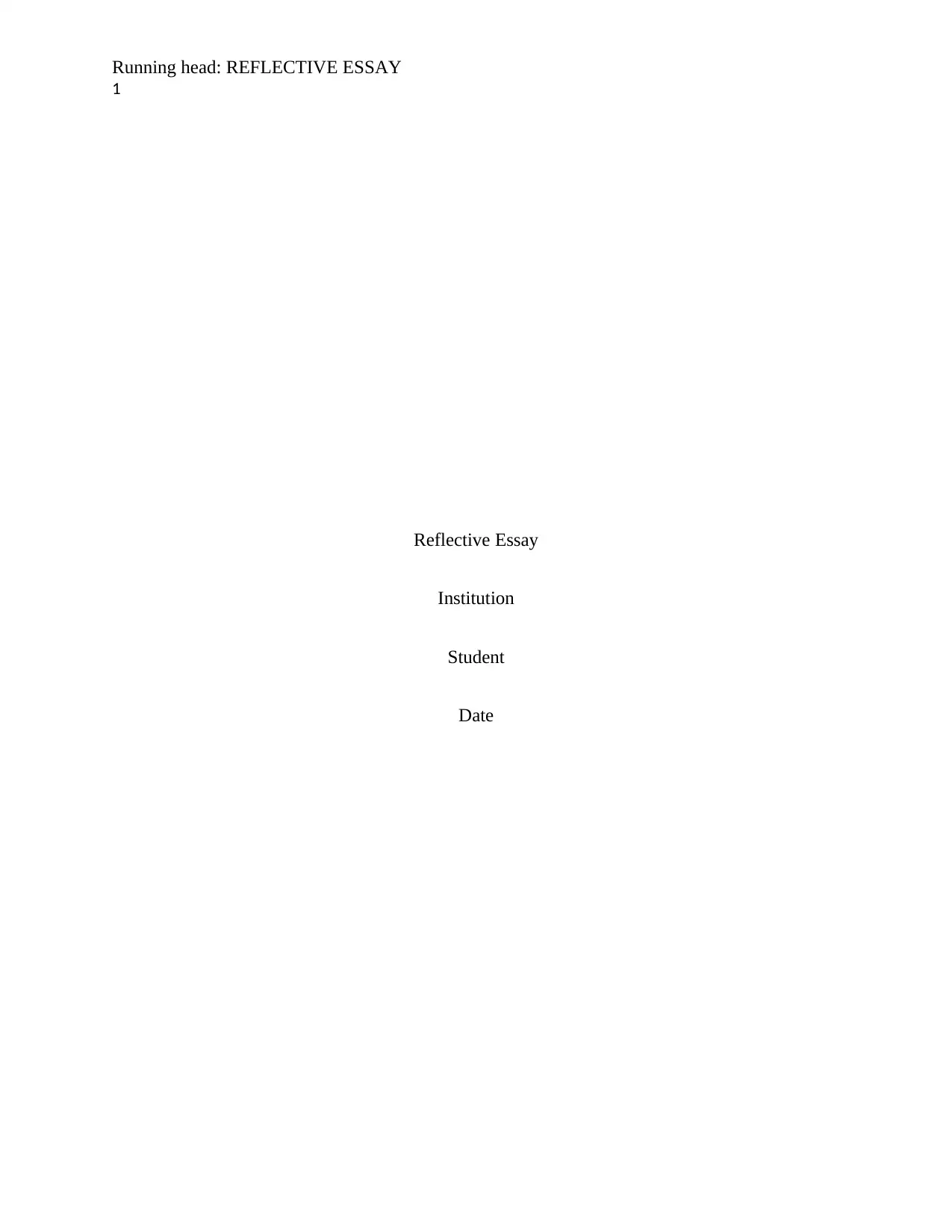
Running head: REFLECTIVE ESSAY
1
Reflective Essay
Institution
Student
Date
1
Reflective Essay
Institution
Student
Date
Paraphrase This Document
Need a fresh take? Get an instant paraphrase of this document with our AI Paraphraser
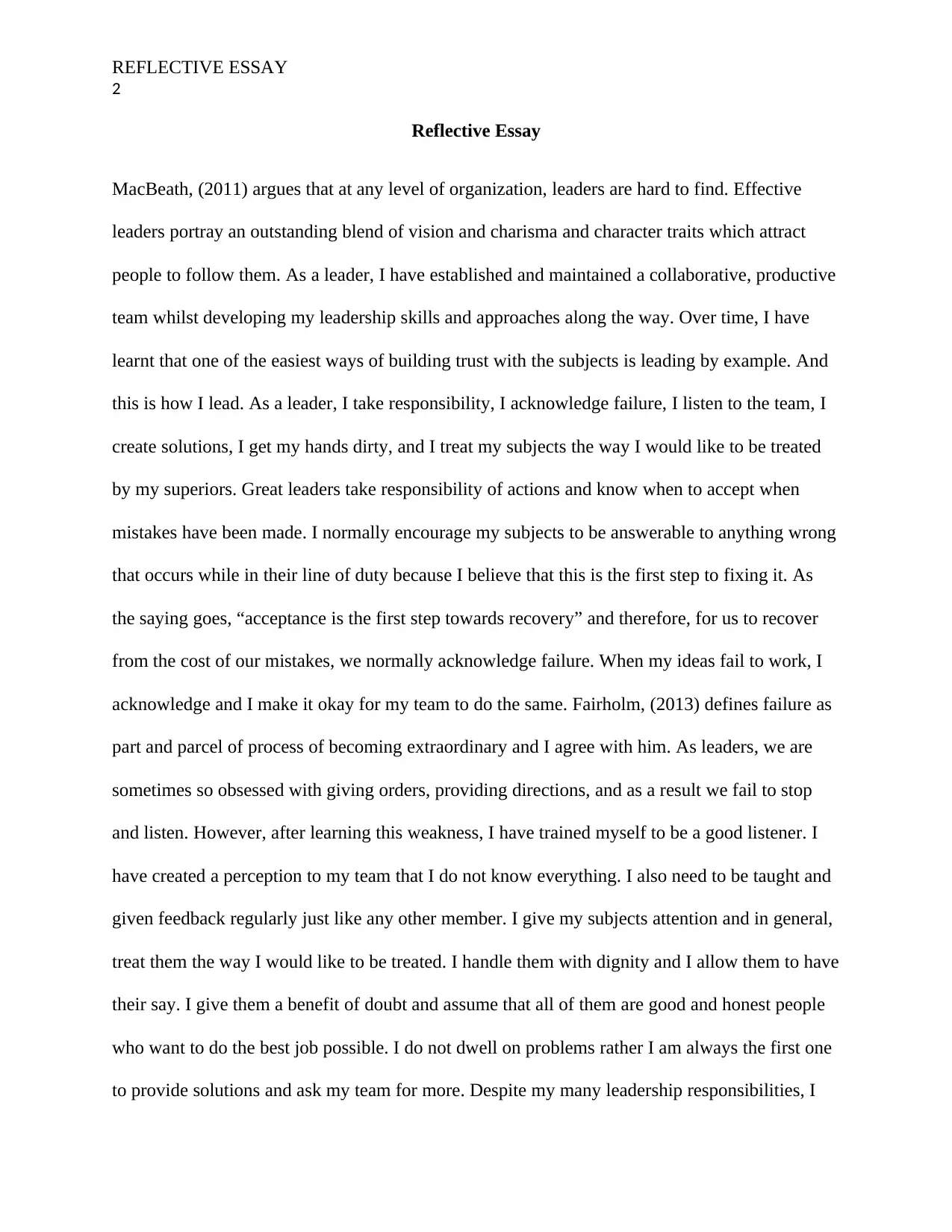
REFLECTIVE ESSAY
2
Reflective Essay
MacBeath, (2011) argues that at any level of organization, leaders are hard to find. Effective
leaders portray an outstanding blend of vision and charisma and character traits which attract
people to follow them. As a leader, I have established and maintained a collaborative, productive
team whilst developing my leadership skills and approaches along the way. Over time, I have
learnt that one of the easiest ways of building trust with the subjects is leading by example. And
this is how I lead. As a leader, I take responsibility, I acknowledge failure, I listen to the team, I
create solutions, I get my hands dirty, and I treat my subjects the way I would like to be treated
by my superiors. Great leaders take responsibility of actions and know when to accept when
mistakes have been made. I normally encourage my subjects to be answerable to anything wrong
that occurs while in their line of duty because I believe that this is the first step to fixing it. As
the saying goes, “acceptance is the first step towards recovery” and therefore, for us to recover
from the cost of our mistakes, we normally acknowledge failure. When my ideas fail to work, I
acknowledge and I make it okay for my team to do the same. Fairholm, (2013) defines failure as
part and parcel of process of becoming extraordinary and I agree with him. As leaders, we are
sometimes so obsessed with giving orders, providing directions, and as a result we fail to stop
and listen. However, after learning this weakness, I have trained myself to be a good listener. I
have created a perception to my team that I do not know everything. I also need to be taught and
given feedback regularly just like any other member. I give my subjects attention and in general,
treat them the way I would like to be treated. I handle them with dignity and I allow them to have
their say. I give them a benefit of doubt and assume that all of them are good and honest people
who want to do the best job possible. I do not dwell on problems rather I am always the first one
to provide solutions and ask my team for more. Despite my many leadership responsibilities, I
2
Reflective Essay
MacBeath, (2011) argues that at any level of organization, leaders are hard to find. Effective
leaders portray an outstanding blend of vision and charisma and character traits which attract
people to follow them. As a leader, I have established and maintained a collaborative, productive
team whilst developing my leadership skills and approaches along the way. Over time, I have
learnt that one of the easiest ways of building trust with the subjects is leading by example. And
this is how I lead. As a leader, I take responsibility, I acknowledge failure, I listen to the team, I
create solutions, I get my hands dirty, and I treat my subjects the way I would like to be treated
by my superiors. Great leaders take responsibility of actions and know when to accept when
mistakes have been made. I normally encourage my subjects to be answerable to anything wrong
that occurs while in their line of duty because I believe that this is the first step to fixing it. As
the saying goes, “acceptance is the first step towards recovery” and therefore, for us to recover
from the cost of our mistakes, we normally acknowledge failure. When my ideas fail to work, I
acknowledge and I make it okay for my team to do the same. Fairholm, (2013) defines failure as
part and parcel of process of becoming extraordinary and I agree with him. As leaders, we are
sometimes so obsessed with giving orders, providing directions, and as a result we fail to stop
and listen. However, after learning this weakness, I have trained myself to be a good listener. I
have created a perception to my team that I do not know everything. I also need to be taught and
given feedback regularly just like any other member. I give my subjects attention and in general,
treat them the way I would like to be treated. I handle them with dignity and I allow them to have
their say. I give them a benefit of doubt and assume that all of them are good and honest people
who want to do the best job possible. I do not dwell on problems rather I am always the first one
to provide solutions and ask my team for more. Despite my many leadership responsibilities, I
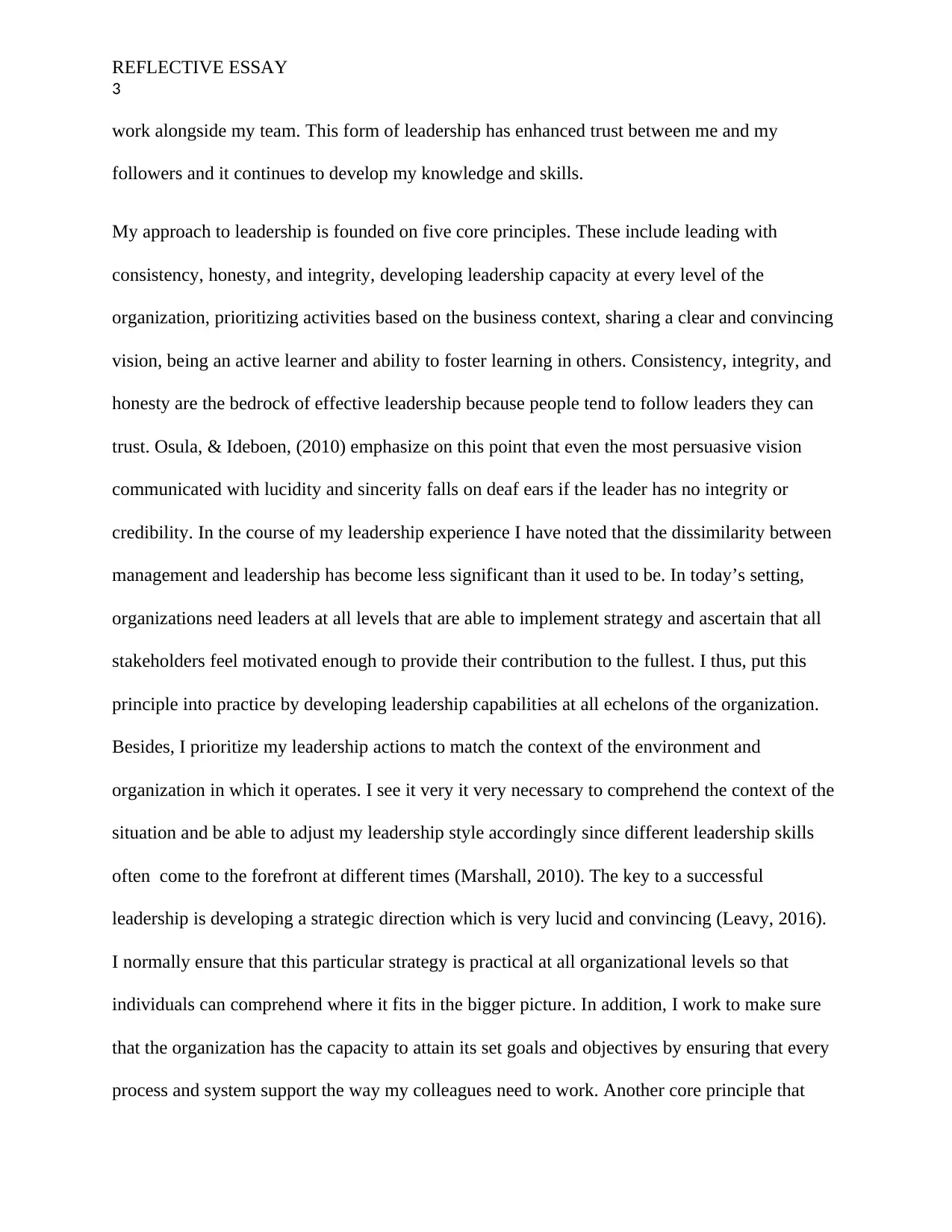
REFLECTIVE ESSAY
3
work alongside my team. This form of leadership has enhanced trust between me and my
followers and it continues to develop my knowledge and skills.
My approach to leadership is founded on five core principles. These include leading with
consistency, honesty, and integrity, developing leadership capacity at every level of the
organization, prioritizing activities based on the business context, sharing a clear and convincing
vision, being an active learner and ability to foster learning in others. Consistency, integrity, and
honesty are the bedrock of effective leadership because people tend to follow leaders they can
trust. Osula, & Ideboen, (2010) emphasize on this point that even the most persuasive vision
communicated with lucidity and sincerity falls on deaf ears if the leader has no integrity or
credibility. In the course of my leadership experience I have noted that the dissimilarity between
management and leadership has become less significant than it used to be. In today’s setting,
organizations need leaders at all levels that are able to implement strategy and ascertain that all
stakeholders feel motivated enough to provide their contribution to the fullest. I thus, put this
principle into practice by developing leadership capabilities at all echelons of the organization.
Besides, I prioritize my leadership actions to match the context of the environment and
organization in which it operates. I see it very it very necessary to comprehend the context of the
situation and be able to adjust my leadership style accordingly since different leadership skills
often come to the forefront at different times (Marshall, 2010). The key to a successful
leadership is developing a strategic direction which is very lucid and convincing (Leavy, 2016).
I normally ensure that this particular strategy is practical at all organizational levels so that
individuals can comprehend where it fits in the bigger picture. In addition, I work to make sure
that the organization has the capacity to attain its set goals and objectives by ensuring that every
process and system support the way my colleagues need to work. Another core principle that
3
work alongside my team. This form of leadership has enhanced trust between me and my
followers and it continues to develop my knowledge and skills.
My approach to leadership is founded on five core principles. These include leading with
consistency, honesty, and integrity, developing leadership capacity at every level of the
organization, prioritizing activities based on the business context, sharing a clear and convincing
vision, being an active learner and ability to foster learning in others. Consistency, integrity, and
honesty are the bedrock of effective leadership because people tend to follow leaders they can
trust. Osula, & Ideboen, (2010) emphasize on this point that even the most persuasive vision
communicated with lucidity and sincerity falls on deaf ears if the leader has no integrity or
credibility. In the course of my leadership experience I have noted that the dissimilarity between
management and leadership has become less significant than it used to be. In today’s setting,
organizations need leaders at all levels that are able to implement strategy and ascertain that all
stakeholders feel motivated enough to provide their contribution to the fullest. I thus, put this
principle into practice by developing leadership capabilities at all echelons of the organization.
Besides, I prioritize my leadership actions to match the context of the environment and
organization in which it operates. I see it very it very necessary to comprehend the context of the
situation and be able to adjust my leadership style accordingly since different leadership skills
often come to the forefront at different times (Marshall, 2010). The key to a successful
leadership is developing a strategic direction which is very lucid and convincing (Leavy, 2016).
I normally ensure that this particular strategy is practical at all organizational levels so that
individuals can comprehend where it fits in the bigger picture. In addition, I work to make sure
that the organization has the capacity to attain its set goals and objectives by ensuring that every
process and system support the way my colleagues need to work. Another core principle that
⊘ This is a preview!⊘
Do you want full access?
Subscribe today to unlock all pages.

Trusted by 1+ million students worldwide
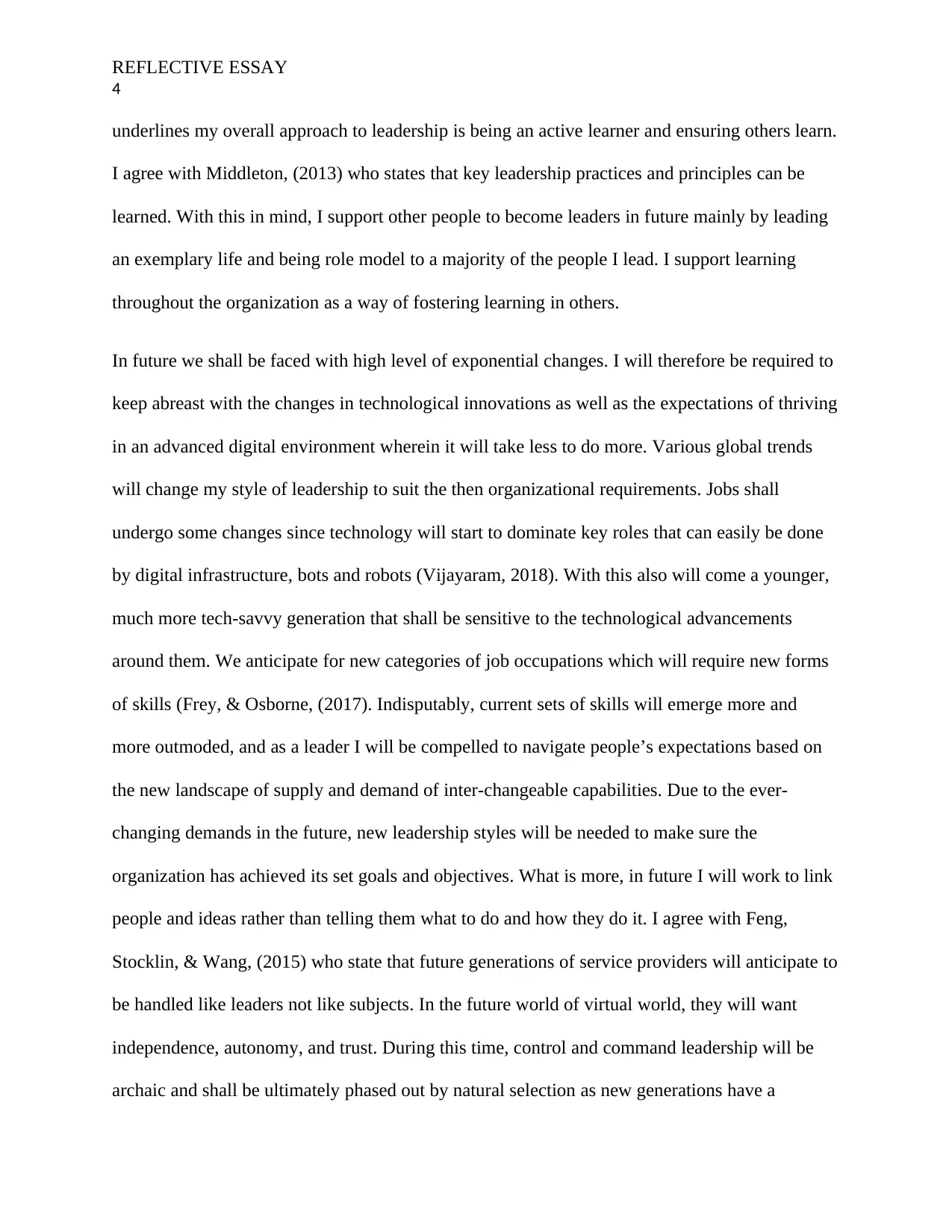
REFLECTIVE ESSAY
4
underlines my overall approach to leadership is being an active learner and ensuring others learn.
I agree with Middleton, (2013) who states that key leadership practices and principles can be
learned. With this in mind, I support other people to become leaders in future mainly by leading
an exemplary life and being role model to a majority of the people I lead. I support learning
throughout the organization as a way of fostering learning in others.
In future we shall be faced with high level of exponential changes. I will therefore be required to
keep abreast with the changes in technological innovations as well as the expectations of thriving
in an advanced digital environment wherein it will take less to do more. Various global trends
will change my style of leadership to suit the then organizational requirements. Jobs shall
undergo some changes since technology will start to dominate key roles that can easily be done
by digital infrastructure, bots and robots (Vijayaram, 2018). With this also will come a younger,
much more tech-savvy generation that shall be sensitive to the technological advancements
around them. We anticipate for new categories of job occupations which will require new forms
of skills (Frey, & Osborne, (2017). Indisputably, current sets of skills will emerge more and
more outmoded, and as a leader I will be compelled to navigate people’s expectations based on
the new landscape of supply and demand of inter-changeable capabilities. Due to the ever-
changing demands in the future, new leadership styles will be needed to make sure the
organization has achieved its set goals and objectives. What is more, in future I will work to link
people and ideas rather than telling them what to do and how they do it. I agree with Feng,
Stocklin, & Wang, (2015) who state that future generations of service providers will anticipate to
be handled like leaders not like subjects. In the future world of virtual world, they will want
independence, autonomy, and trust. During this time, control and command leadership will be
archaic and shall be ultimately phased out by natural selection as new generations have a
4
underlines my overall approach to leadership is being an active learner and ensuring others learn.
I agree with Middleton, (2013) who states that key leadership practices and principles can be
learned. With this in mind, I support other people to become leaders in future mainly by leading
an exemplary life and being role model to a majority of the people I lead. I support learning
throughout the organization as a way of fostering learning in others.
In future we shall be faced with high level of exponential changes. I will therefore be required to
keep abreast with the changes in technological innovations as well as the expectations of thriving
in an advanced digital environment wherein it will take less to do more. Various global trends
will change my style of leadership to suit the then organizational requirements. Jobs shall
undergo some changes since technology will start to dominate key roles that can easily be done
by digital infrastructure, bots and robots (Vijayaram, 2018). With this also will come a younger,
much more tech-savvy generation that shall be sensitive to the technological advancements
around them. We anticipate for new categories of job occupations which will require new forms
of skills (Frey, & Osborne, (2017). Indisputably, current sets of skills will emerge more and
more outmoded, and as a leader I will be compelled to navigate people’s expectations based on
the new landscape of supply and demand of inter-changeable capabilities. Due to the ever-
changing demands in the future, new leadership styles will be needed to make sure the
organization has achieved its set goals and objectives. What is more, in future I will work to link
people and ideas rather than telling them what to do and how they do it. I agree with Feng,
Stocklin, & Wang, (2015) who state that future generations of service providers will anticipate to
be handled like leaders not like subjects. In the future world of virtual world, they will want
independence, autonomy, and trust. During this time, control and command leadership will be
archaic and shall be ultimately phased out by natural selection as new generations have a
Paraphrase This Document
Need a fresh take? Get an instant paraphrase of this document with our AI Paraphraser

REFLECTIVE ESSAY
5
leadership style which is a product of the way they view the world. This particular style shall be
empowering in a fast paced work setting where employees will need to be treated like leaders
who can be fully respected and trusted. As leaders we shall be impelled to shun away from
directive and controlling leadership style and become more adaptable leaders who views
leadership from a novel perspective. Besides, leaders will need to be educated to comprehend
how human brain connects with their mind body through neuroleadership (Ringleb, Rock, &
Ancona, 2015). Advancements in science shall provide us with answers to the way the brain
functions and so, we shall be adequately informed ‘why’ people act the way they do. In the
coming days, a positive psychology will take a tighter grip in the workplace and as a leader, I
will cultivate people’s mindset with hope that after getting the mindset right, their behaviors will
follow. Gleeson, (2017) says that this will be a mindset of agency and purpose, wherein leaders
will acknowledge why they are here and what their unique role is in the organization.
According to Jogulu, (2010), styles of leadership are not one-size-fits-all. As a matter of fact,
there are different types of leaders who exhibit different weaknesses and strengths. Whilst there
are so many styles of leadership, the real question is not about what type of a leader I am now
but about what kind of leaders I want to be. With this in mind, I am certain that I will redirect my
strengths to emerge the type of leader I want to be. Personally, I want to be that kind of a leader
who supports and encourages others to grow. I would like to nature talents and brand other
people to become leaders of tomorrow. This implies that I disagree with the old adage that goes
like “leaders are born, they are not made.” I believe that nobody is born a leader rather anybody
can become a successful leader after being branded with essential leadership skills which are
gradually enhanced through exposure and experience from other leaders. I want to be a leader
who shows other potential leaders the way by leading by example and creating an environment
5
leadership style which is a product of the way they view the world. This particular style shall be
empowering in a fast paced work setting where employees will need to be treated like leaders
who can be fully respected and trusted. As leaders we shall be impelled to shun away from
directive and controlling leadership style and become more adaptable leaders who views
leadership from a novel perspective. Besides, leaders will need to be educated to comprehend
how human brain connects with their mind body through neuroleadership (Ringleb, Rock, &
Ancona, 2015). Advancements in science shall provide us with answers to the way the brain
functions and so, we shall be adequately informed ‘why’ people act the way they do. In the
coming days, a positive psychology will take a tighter grip in the workplace and as a leader, I
will cultivate people’s mindset with hope that after getting the mindset right, their behaviors will
follow. Gleeson, (2017) says that this will be a mindset of agency and purpose, wherein leaders
will acknowledge why they are here and what their unique role is in the organization.
According to Jogulu, (2010), styles of leadership are not one-size-fits-all. As a matter of fact,
there are different types of leaders who exhibit different weaknesses and strengths. Whilst there
are so many styles of leadership, the real question is not about what type of a leader I am now
but about what kind of leaders I want to be. With this in mind, I am certain that I will redirect my
strengths to emerge the type of leader I want to be. Personally, I want to be that kind of a leader
who supports and encourages others to grow. I would like to nature talents and brand other
people to become leaders of tomorrow. This implies that I disagree with the old adage that goes
like “leaders are born, they are not made.” I believe that nobody is born a leader rather anybody
can become a successful leader after being branded with essential leadership skills which are
gradually enhanced through exposure and experience from other leaders. I want to be a leader
who shows other potential leaders the way by leading by example and creating an environment
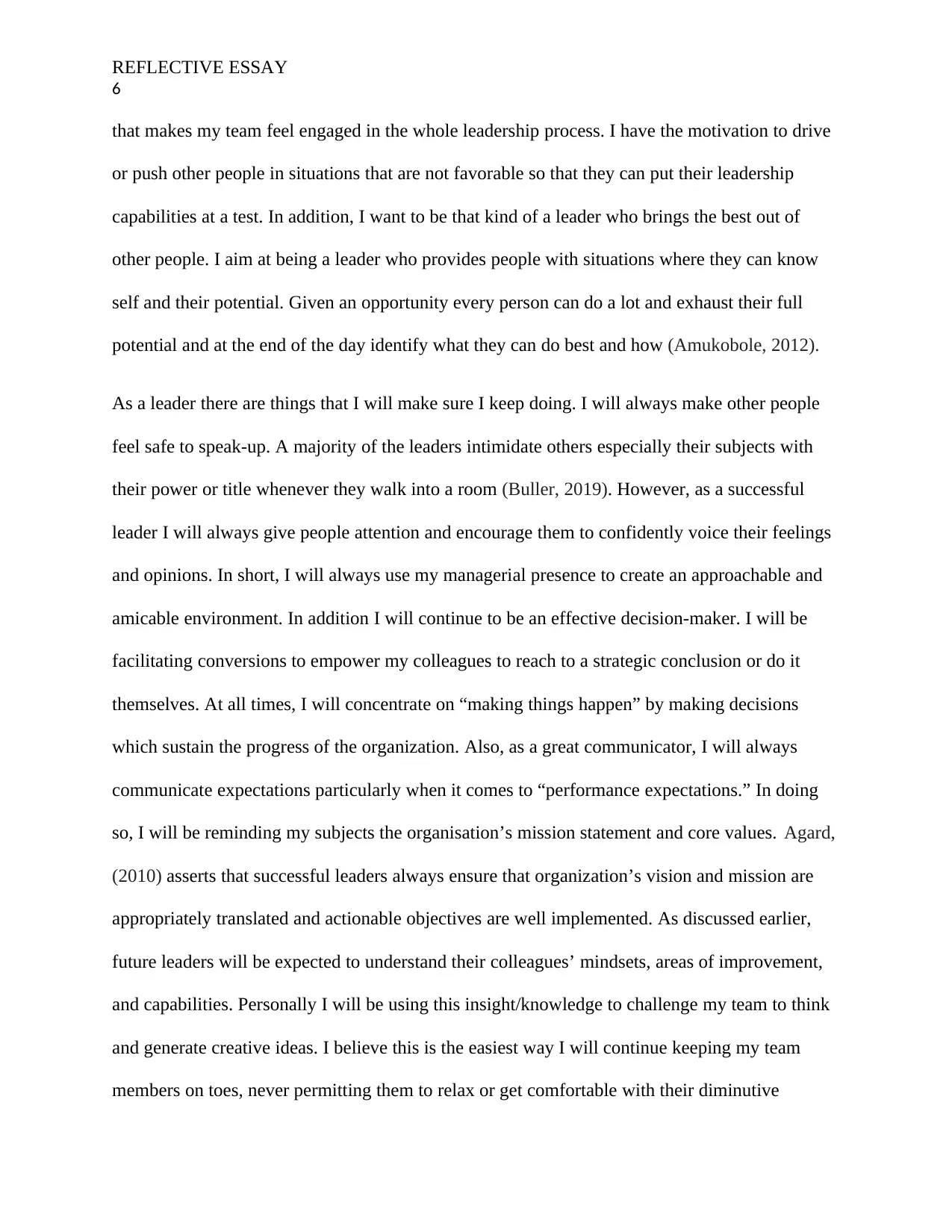
REFLECTIVE ESSAY
6
that makes my team feel engaged in the whole leadership process. I have the motivation to drive
or push other people in situations that are not favorable so that they can put their leadership
capabilities at a test. In addition, I want to be that kind of a leader who brings the best out of
other people. I aim at being a leader who provides people with situations where they can know
self and their potential. Given an opportunity every person can do a lot and exhaust their full
potential and at the end of the day identify what they can do best and how (Amukobole, 2012).
As a leader there are things that I will make sure I keep doing. I will always make other people
feel safe to speak-up. A majority of the leaders intimidate others especially their subjects with
their power or title whenever they walk into a room (Buller, 2019). However, as a successful
leader I will always give people attention and encourage them to confidently voice their feelings
and opinions. In short, I will always use my managerial presence to create an approachable and
amicable environment. In addition I will continue to be an effective decision-maker. I will be
facilitating conversions to empower my colleagues to reach to a strategic conclusion or do it
themselves. At all times, I will concentrate on “making things happen” by making decisions
which sustain the progress of the organization. Also, as a great communicator, I will always
communicate expectations particularly when it comes to “performance expectations.” In doing
so, I will be reminding my subjects the organisation’s mission statement and core values. Agard,
(2010) asserts that successful leaders always ensure that organization’s vision and mission are
appropriately translated and actionable objectives are well implemented. As discussed earlier,
future leaders will be expected to understand their colleagues’ mindsets, areas of improvement,
and capabilities. Personally I will be using this insight/knowledge to challenge my team to think
and generate creative ideas. I believe this is the easiest way I will continue keeping my team
members on toes, never permitting them to relax or get comfortable with their diminutive
6
that makes my team feel engaged in the whole leadership process. I have the motivation to drive
or push other people in situations that are not favorable so that they can put their leadership
capabilities at a test. In addition, I want to be that kind of a leader who brings the best out of
other people. I aim at being a leader who provides people with situations where they can know
self and their potential. Given an opportunity every person can do a lot and exhaust their full
potential and at the end of the day identify what they can do best and how (Amukobole, 2012).
As a leader there are things that I will make sure I keep doing. I will always make other people
feel safe to speak-up. A majority of the leaders intimidate others especially their subjects with
their power or title whenever they walk into a room (Buller, 2019). However, as a successful
leader I will always give people attention and encourage them to confidently voice their feelings
and opinions. In short, I will always use my managerial presence to create an approachable and
amicable environment. In addition I will continue to be an effective decision-maker. I will be
facilitating conversions to empower my colleagues to reach to a strategic conclusion or do it
themselves. At all times, I will concentrate on “making things happen” by making decisions
which sustain the progress of the organization. Also, as a great communicator, I will always
communicate expectations particularly when it comes to “performance expectations.” In doing
so, I will be reminding my subjects the organisation’s mission statement and core values. Agard,
(2010) asserts that successful leaders always ensure that organization’s vision and mission are
appropriately translated and actionable objectives are well implemented. As discussed earlier,
future leaders will be expected to understand their colleagues’ mindsets, areas of improvement,
and capabilities. Personally I will be using this insight/knowledge to challenge my team to think
and generate creative ideas. I believe this is the easiest way I will continue keeping my team
members on toes, never permitting them to relax or get comfortable with their diminutive
⊘ This is a preview!⊘
Do you want full access?
Subscribe today to unlock all pages.

Trusted by 1+ million students worldwide
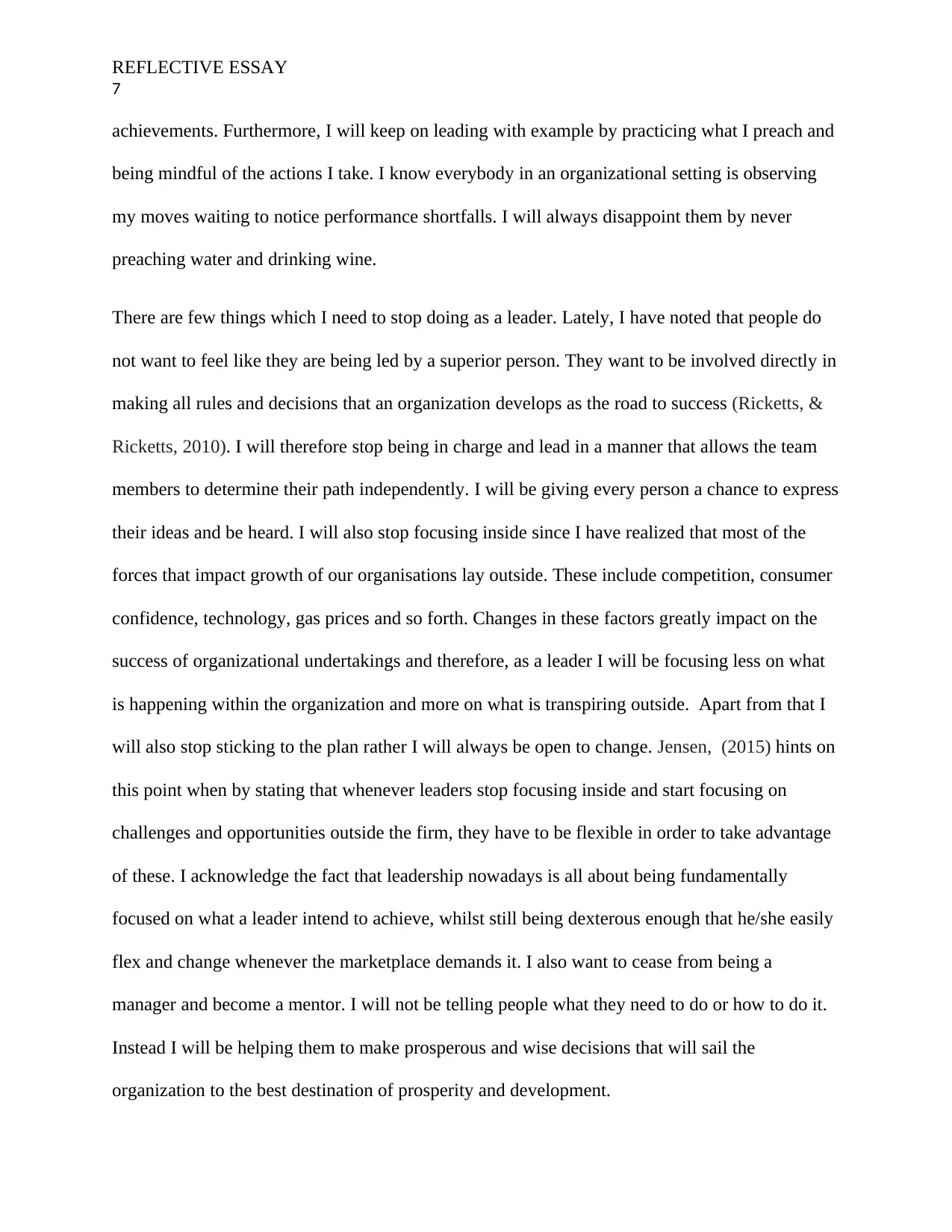
REFLECTIVE ESSAY
7
achievements. Furthermore, I will keep on leading with example by practicing what I preach and
being mindful of the actions I take. I know everybody in an organizational setting is observing
my moves waiting to notice performance shortfalls. I will always disappoint them by never
preaching water and drinking wine.
There are few things which I need to stop doing as a leader. Lately, I have noted that people do
not want to feel like they are being led by a superior person. They want to be involved directly in
making all rules and decisions that an organization develops as the road to success (Ricketts, &
Ricketts, 2010). I will therefore stop being in charge and lead in a manner that allows the team
members to determine their path independently. I will be giving every person a chance to express
their ideas and be heard. I will also stop focusing inside since I have realized that most of the
forces that impact growth of our organisations lay outside. These include competition, consumer
confidence, technology, gas prices and so forth. Changes in these factors greatly impact on the
success of organizational undertakings and therefore, as a leader I will be focusing less on what
is happening within the organization and more on what is transpiring outside. Apart from that I
will also stop sticking to the plan rather I will always be open to change. Jensen, (2015) hints on
this point when by stating that whenever leaders stop focusing inside and start focusing on
challenges and opportunities outside the firm, they have to be flexible in order to take advantage
of these. I acknowledge the fact that leadership nowadays is all about being fundamentally
focused on what a leader intend to achieve, whilst still being dexterous enough that he/she easily
flex and change whenever the marketplace demands it. I also want to cease from being a
manager and become a mentor. I will not be telling people what they need to do or how to do it.
Instead I will be helping them to make prosperous and wise decisions that will sail the
organization to the best destination of prosperity and development.
7
achievements. Furthermore, I will keep on leading with example by practicing what I preach and
being mindful of the actions I take. I know everybody in an organizational setting is observing
my moves waiting to notice performance shortfalls. I will always disappoint them by never
preaching water and drinking wine.
There are few things which I need to stop doing as a leader. Lately, I have noted that people do
not want to feel like they are being led by a superior person. They want to be involved directly in
making all rules and decisions that an organization develops as the road to success (Ricketts, &
Ricketts, 2010). I will therefore stop being in charge and lead in a manner that allows the team
members to determine their path independently. I will be giving every person a chance to express
their ideas and be heard. I will also stop focusing inside since I have realized that most of the
forces that impact growth of our organisations lay outside. These include competition, consumer
confidence, technology, gas prices and so forth. Changes in these factors greatly impact on the
success of organizational undertakings and therefore, as a leader I will be focusing less on what
is happening within the organization and more on what is transpiring outside. Apart from that I
will also stop sticking to the plan rather I will always be open to change. Jensen, (2015) hints on
this point when by stating that whenever leaders stop focusing inside and start focusing on
challenges and opportunities outside the firm, they have to be flexible in order to take advantage
of these. I acknowledge the fact that leadership nowadays is all about being fundamentally
focused on what a leader intend to achieve, whilst still being dexterous enough that he/she easily
flex and change whenever the marketplace demands it. I also want to cease from being a
manager and become a mentor. I will not be telling people what they need to do or how to do it.
Instead I will be helping them to make prosperous and wise decisions that will sail the
organization to the best destination of prosperity and development.
Paraphrase This Document
Need a fresh take? Get an instant paraphrase of this document with our AI Paraphraser
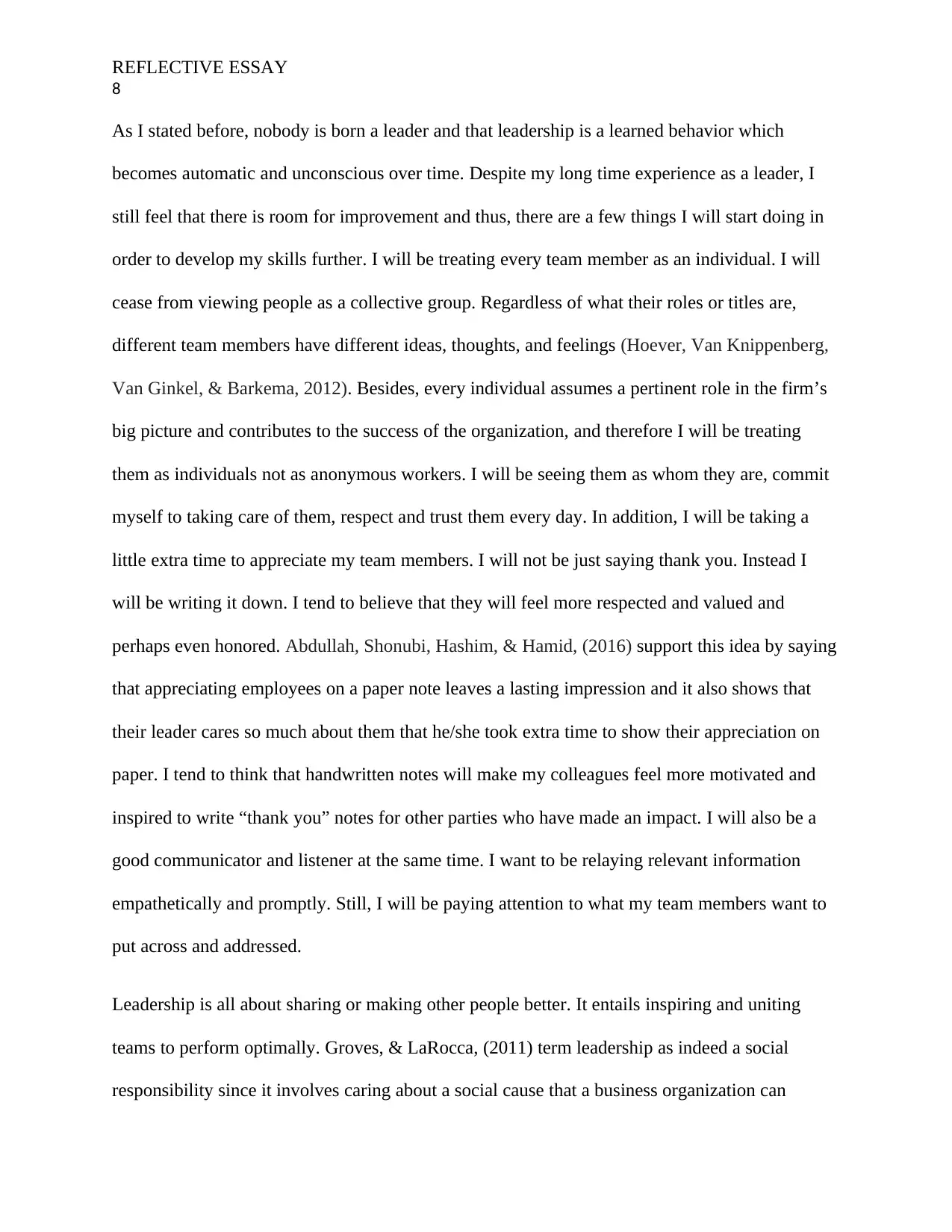
REFLECTIVE ESSAY
8
As I stated before, nobody is born a leader and that leadership is a learned behavior which
becomes automatic and unconscious over time. Despite my long time experience as a leader, I
still feel that there is room for improvement and thus, there are a few things I will start doing in
order to develop my skills further. I will be treating every team member as an individual. I will
cease from viewing people as a collective group. Regardless of what their roles or titles are,
different team members have different ideas, thoughts, and feelings (Hoever, Van Knippenberg,
Van Ginkel, & Barkema, 2012). Besides, every individual assumes a pertinent role in the firm’s
big picture and contributes to the success of the organization, and therefore I will be treating
them as individuals not as anonymous workers. I will be seeing them as whom they are, commit
myself to taking care of them, respect and trust them every day. In addition, I will be taking a
little extra time to appreciate my team members. I will not be just saying thank you. Instead I
will be writing it down. I tend to believe that they will feel more respected and valued and
perhaps even honored. Abdullah, Shonubi, Hashim, & Hamid, (2016) support this idea by saying
that appreciating employees on a paper note leaves a lasting impression and it also shows that
their leader cares so much about them that he/she took extra time to show their appreciation on
paper. I tend to think that handwritten notes will make my colleagues feel more motivated and
inspired to write “thank you” notes for other parties who have made an impact. I will also be a
good communicator and listener at the same time. I want to be relaying relevant information
empathetically and promptly. Still, I will be paying attention to what my team members want to
put across and addressed.
Leadership is all about sharing or making other people better. It entails inspiring and uniting
teams to perform optimally. Groves, & LaRocca, (2011) term leadership as indeed a social
responsibility since it involves caring about a social cause that a business organization can
8
As I stated before, nobody is born a leader and that leadership is a learned behavior which
becomes automatic and unconscious over time. Despite my long time experience as a leader, I
still feel that there is room for improvement and thus, there are a few things I will start doing in
order to develop my skills further. I will be treating every team member as an individual. I will
cease from viewing people as a collective group. Regardless of what their roles or titles are,
different team members have different ideas, thoughts, and feelings (Hoever, Van Knippenberg,
Van Ginkel, & Barkema, 2012). Besides, every individual assumes a pertinent role in the firm’s
big picture and contributes to the success of the organization, and therefore I will be treating
them as individuals not as anonymous workers. I will be seeing them as whom they are, commit
myself to taking care of them, respect and trust them every day. In addition, I will be taking a
little extra time to appreciate my team members. I will not be just saying thank you. Instead I
will be writing it down. I tend to believe that they will feel more respected and valued and
perhaps even honored. Abdullah, Shonubi, Hashim, & Hamid, (2016) support this idea by saying
that appreciating employees on a paper note leaves a lasting impression and it also shows that
their leader cares so much about them that he/she took extra time to show their appreciation on
paper. I tend to think that handwritten notes will make my colleagues feel more motivated and
inspired to write “thank you” notes for other parties who have made an impact. I will also be a
good communicator and listener at the same time. I want to be relaying relevant information
empathetically and promptly. Still, I will be paying attention to what my team members want to
put across and addressed.
Leadership is all about sharing or making other people better. It entails inspiring and uniting
teams to perform optimally. Groves, & LaRocca, (2011) term leadership as indeed a social
responsibility since it involves caring about a social cause that a business organization can
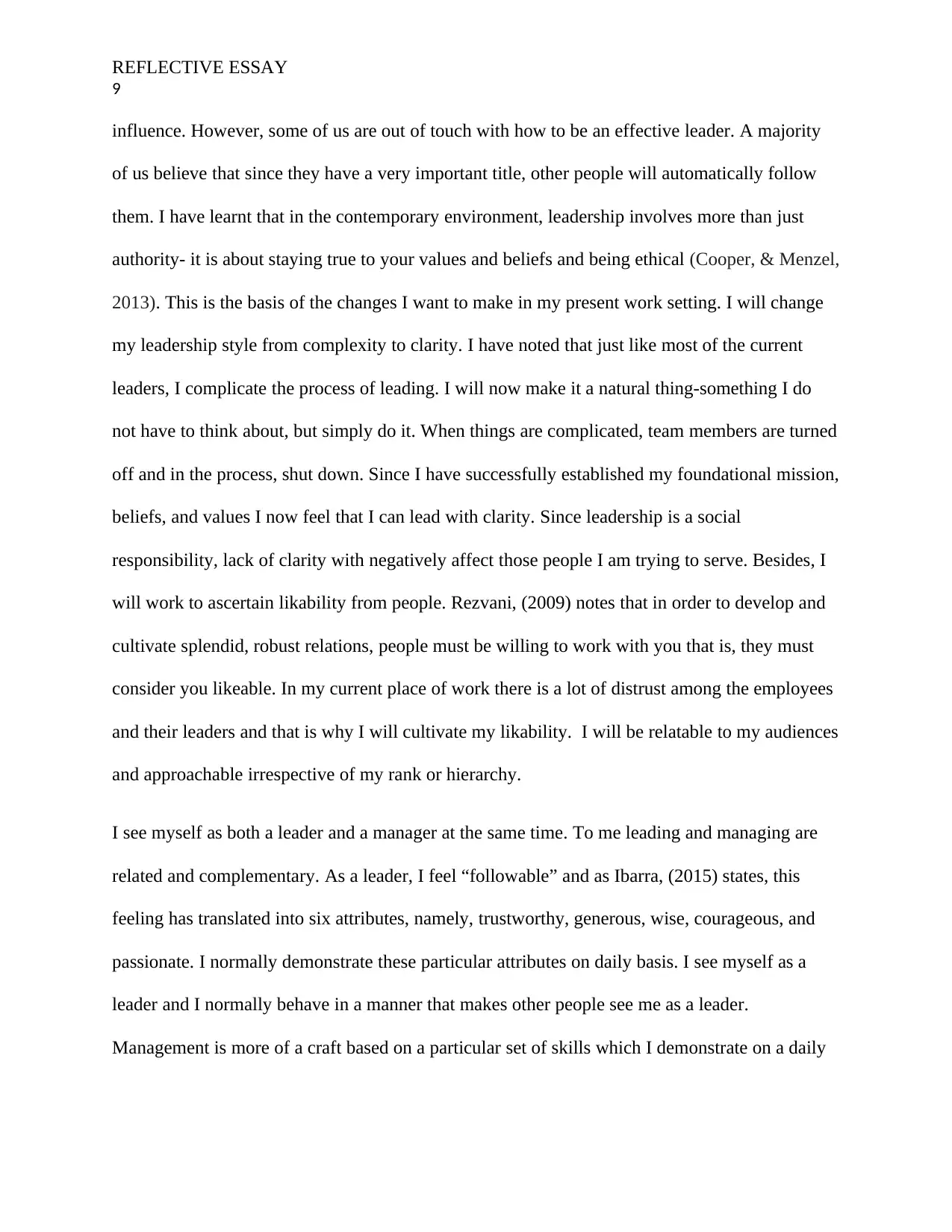
REFLECTIVE ESSAY
9
influence. However, some of us are out of touch with how to be an effective leader. A majority
of us believe that since they have a very important title, other people will automatically follow
them. I have learnt that in the contemporary environment, leadership involves more than just
authority- it is about staying true to your values and beliefs and being ethical (Cooper, & Menzel,
2013). This is the basis of the changes I want to make in my present work setting. I will change
my leadership style from complexity to clarity. I have noted that just like most of the current
leaders, I complicate the process of leading. I will now make it a natural thing-something I do
not have to think about, but simply do it. When things are complicated, team members are turned
off and in the process, shut down. Since I have successfully established my foundational mission,
beliefs, and values I now feel that I can lead with clarity. Since leadership is a social
responsibility, lack of clarity with negatively affect those people I am trying to serve. Besides, I
will work to ascertain likability from people. Rezvani, (2009) notes that in order to develop and
cultivate splendid, robust relations, people must be willing to work with you that is, they must
consider you likeable. In my current place of work there is a lot of distrust among the employees
and their leaders and that is why I will cultivate my likability. I will be relatable to my audiences
and approachable irrespective of my rank or hierarchy.
I see myself as both a leader and a manager at the same time. To me leading and managing are
related and complementary. As a leader, I feel “followable” and as Ibarra, (2015) states, this
feeling has translated into six attributes, namely, trustworthy, generous, wise, courageous, and
passionate. I normally demonstrate these particular attributes on daily basis. I see myself as a
leader and I normally behave in a manner that makes other people see me as a leader.
Management is more of a craft based on a particular set of skills which I demonstrate on a daily
9
influence. However, some of us are out of touch with how to be an effective leader. A majority
of us believe that since they have a very important title, other people will automatically follow
them. I have learnt that in the contemporary environment, leadership involves more than just
authority- it is about staying true to your values and beliefs and being ethical (Cooper, & Menzel,
2013). This is the basis of the changes I want to make in my present work setting. I will change
my leadership style from complexity to clarity. I have noted that just like most of the current
leaders, I complicate the process of leading. I will now make it a natural thing-something I do
not have to think about, but simply do it. When things are complicated, team members are turned
off and in the process, shut down. Since I have successfully established my foundational mission,
beliefs, and values I now feel that I can lead with clarity. Since leadership is a social
responsibility, lack of clarity with negatively affect those people I am trying to serve. Besides, I
will work to ascertain likability from people. Rezvani, (2009) notes that in order to develop and
cultivate splendid, robust relations, people must be willing to work with you that is, they must
consider you likeable. In my current place of work there is a lot of distrust among the employees
and their leaders and that is why I will cultivate my likability. I will be relatable to my audiences
and approachable irrespective of my rank or hierarchy.
I see myself as both a leader and a manager at the same time. To me leading and managing are
related and complementary. As a leader, I feel “followable” and as Ibarra, (2015) states, this
feeling has translated into six attributes, namely, trustworthy, generous, wise, courageous, and
passionate. I normally demonstrate these particular attributes on daily basis. I see myself as a
leader and I normally behave in a manner that makes other people see me as a leader.
Management is more of a craft based on a particular set of skills which I demonstrate on a daily
⊘ This is a preview!⊘
Do you want full access?
Subscribe today to unlock all pages.

Trusted by 1+ million students worldwide
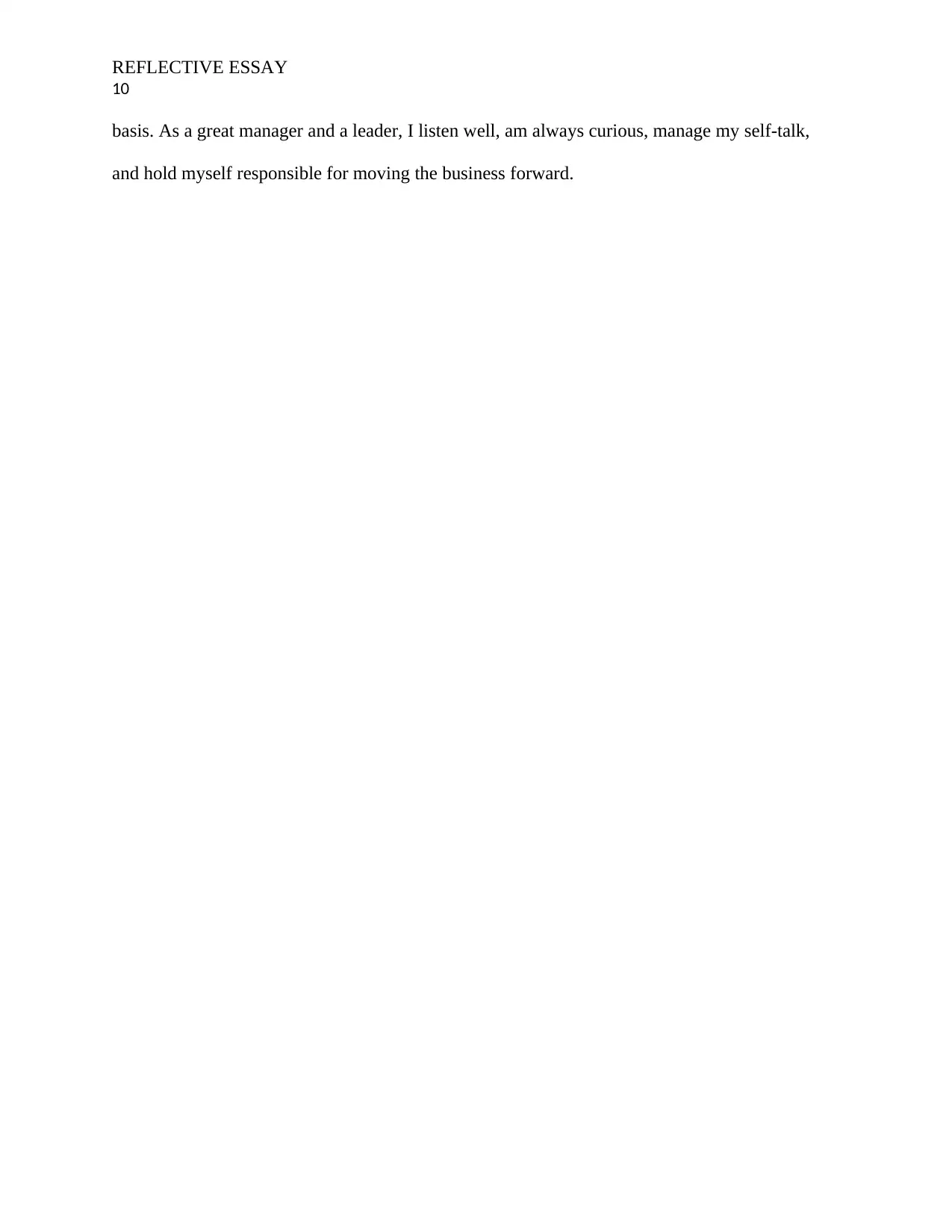
REFLECTIVE ESSAY
10
basis. As a great manager and a leader, I listen well, am always curious, manage my self-talk,
and hold myself responsible for moving the business forward.
10
basis. As a great manager and a leader, I listen well, am always curious, manage my self-talk,
and hold myself responsible for moving the business forward.
Paraphrase This Document
Need a fresh take? Get an instant paraphrase of this document with our AI Paraphraser
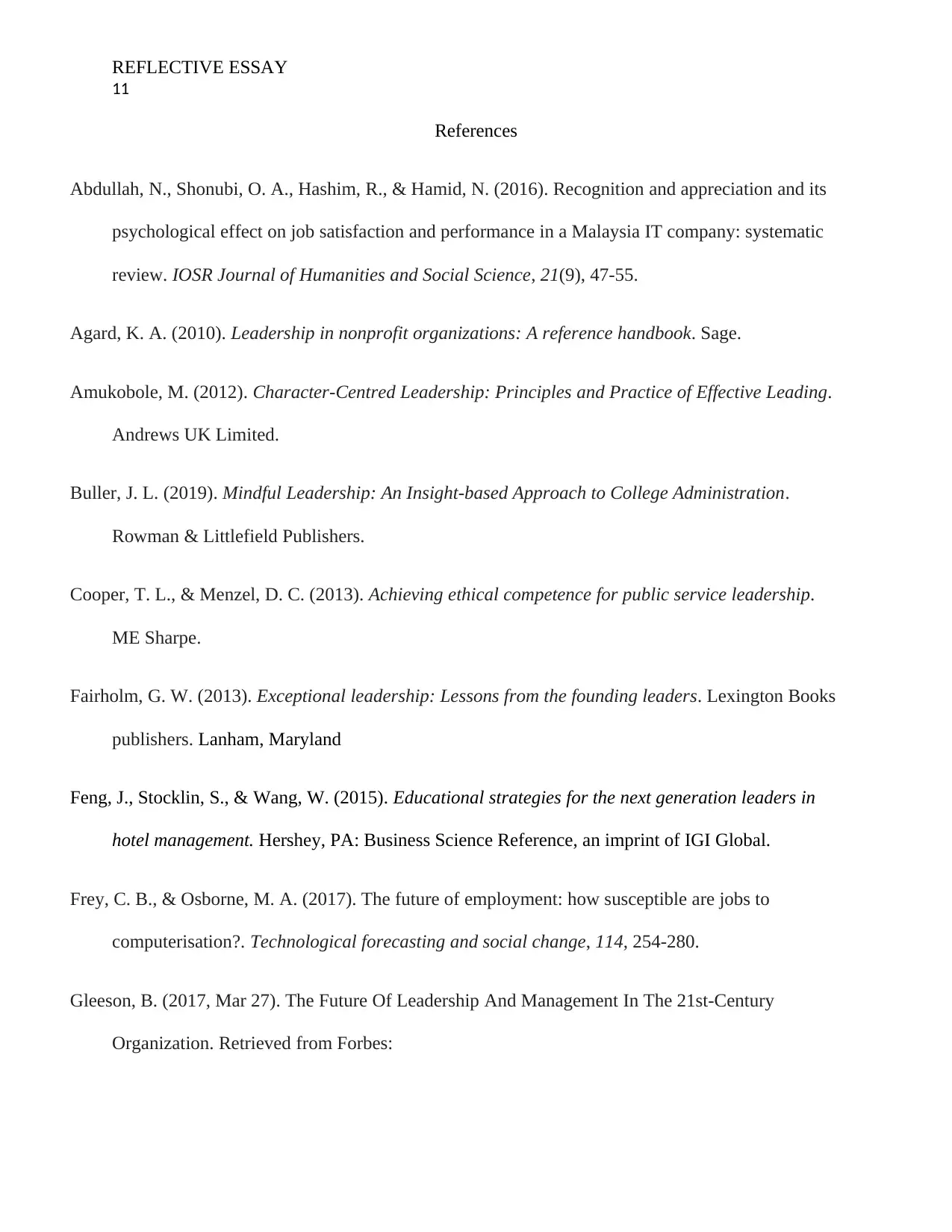
REFLECTIVE ESSAY
11
References
Abdullah, N., Shonubi, O. A., Hashim, R., & Hamid, N. (2016). Recognition and appreciation and its
psychological effect on job satisfaction and performance in a Malaysia IT company: systematic
review. IOSR Journal of Humanities and Social Science, 21(9), 47-55.
Agard, K. A. (2010). Leadership in nonprofit organizations: A reference handbook. Sage.
Amukobole, M. (2012). Character-Centred Leadership: Principles and Practice of Effective Leading.
Andrews UK Limited.
Buller, J. L. (2019). Mindful Leadership: An Insight-based Approach to College Administration.
Rowman & Littlefield Publishers.
Cooper, T. L., & Menzel, D. C. (2013). Achieving ethical competence for public service leadership.
ME Sharpe.
Fairholm, G. W. (2013). Exceptional leadership: Lessons from the founding leaders. Lexington Books
publishers. Lanham, Maryland
Feng, J., Stocklin, S., & Wang, W. (2015). Educational strategies for the next generation leaders in
hotel management. Hershey, PA: Business Science Reference, an imprint of IGI Global.
Frey, C. B., & Osborne, M. A. (2017). The future of employment: how susceptible are jobs to
computerisation?. Technological forecasting and social change, 114, 254-280.
Gleeson, B. (2017, Mar 27). The Future Of Leadership And Management In The 21st-Century
Organization. Retrieved from Forbes:
11
References
Abdullah, N., Shonubi, O. A., Hashim, R., & Hamid, N. (2016). Recognition and appreciation and its
psychological effect on job satisfaction and performance in a Malaysia IT company: systematic
review. IOSR Journal of Humanities and Social Science, 21(9), 47-55.
Agard, K. A. (2010). Leadership in nonprofit organizations: A reference handbook. Sage.
Amukobole, M. (2012). Character-Centred Leadership: Principles and Practice of Effective Leading.
Andrews UK Limited.
Buller, J. L. (2019). Mindful Leadership: An Insight-based Approach to College Administration.
Rowman & Littlefield Publishers.
Cooper, T. L., & Menzel, D. C. (2013). Achieving ethical competence for public service leadership.
ME Sharpe.
Fairholm, G. W. (2013). Exceptional leadership: Lessons from the founding leaders. Lexington Books
publishers. Lanham, Maryland
Feng, J., Stocklin, S., & Wang, W. (2015). Educational strategies for the next generation leaders in
hotel management. Hershey, PA: Business Science Reference, an imprint of IGI Global.
Frey, C. B., & Osborne, M. A. (2017). The future of employment: how susceptible are jobs to
computerisation?. Technological forecasting and social change, 114, 254-280.
Gleeson, B. (2017, Mar 27). The Future Of Leadership And Management In The 21st-Century
Organization. Retrieved from Forbes:
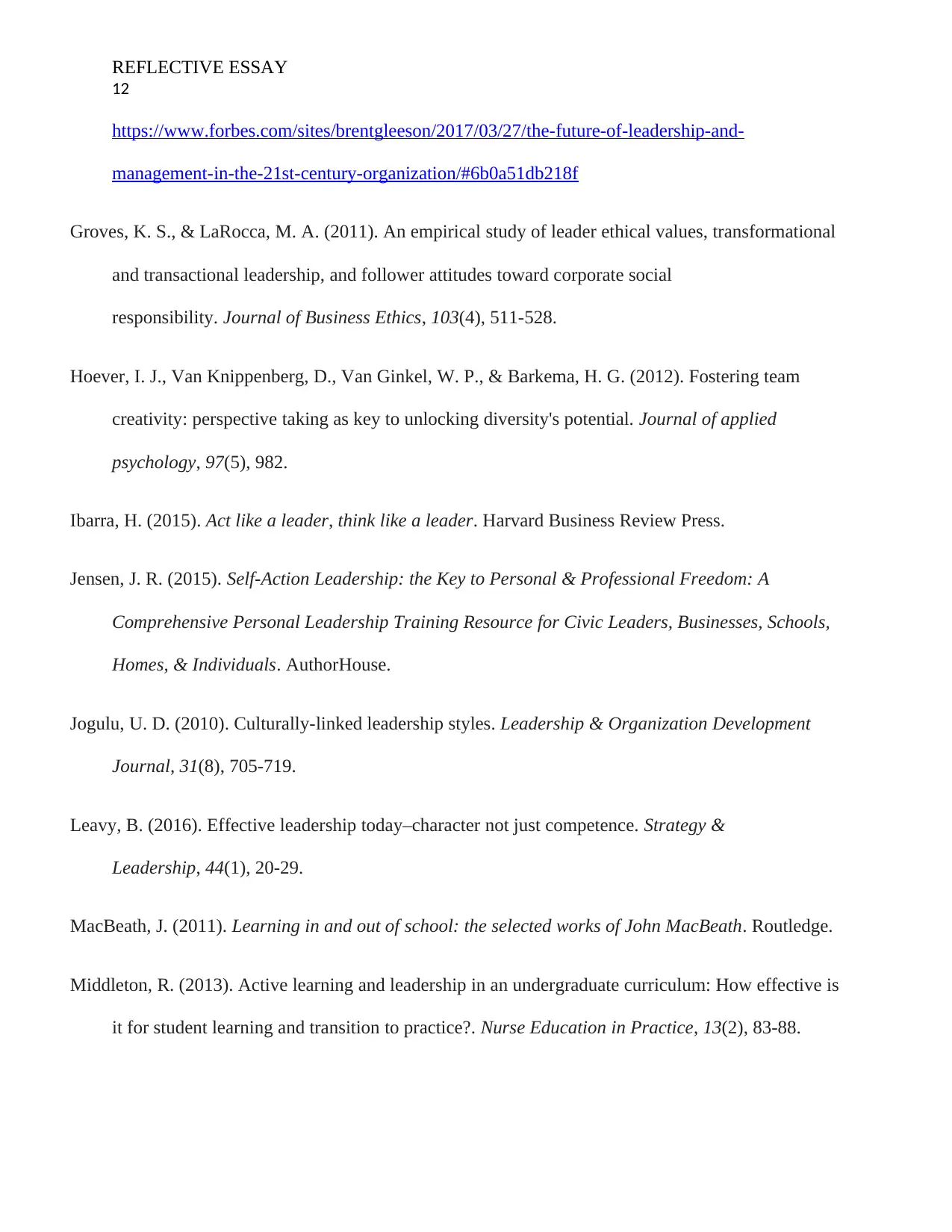
REFLECTIVE ESSAY
12
https://www.forbes.com/sites/brentgleeson/2017/03/27/the-future-of-leadership-and-
management-in-the-21st-century-organization/#6b0a51db218f
Groves, K. S., & LaRocca, M. A. (2011). An empirical study of leader ethical values, transformational
and transactional leadership, and follower attitudes toward corporate social
responsibility. Journal of Business Ethics, 103(4), 511-528.
Hoever, I. J., Van Knippenberg, D., Van Ginkel, W. P., & Barkema, H. G. (2012). Fostering team
creativity: perspective taking as key to unlocking diversity's potential. Journal of applied
psychology, 97(5), 982.
Ibarra, H. (2015). Act like a leader, think like a leader. Harvard Business Review Press.
Jensen, J. R. (2015). Self-Action Leadership: the Key to Personal & Professional Freedom: A
Comprehensive Personal Leadership Training Resource for Civic Leaders, Businesses, Schools,
Homes, & Individuals. AuthorHouse.
Jogulu, U. D. (2010). Culturally-linked leadership styles. Leadership & Organization Development
Journal, 31(8), 705-719.
Leavy, B. (2016). Effective leadership today–character not just competence. Strategy &
Leadership, 44(1), 20-29.
MacBeath, J. (2011). Learning in and out of school: the selected works of John MacBeath. Routledge.
Middleton, R. (2013). Active learning and leadership in an undergraduate curriculum: How effective is
it for student learning and transition to practice?. Nurse Education in Practice, 13(2), 83-88.
12
https://www.forbes.com/sites/brentgleeson/2017/03/27/the-future-of-leadership-and-
management-in-the-21st-century-organization/#6b0a51db218f
Groves, K. S., & LaRocca, M. A. (2011). An empirical study of leader ethical values, transformational
and transactional leadership, and follower attitudes toward corporate social
responsibility. Journal of Business Ethics, 103(4), 511-528.
Hoever, I. J., Van Knippenberg, D., Van Ginkel, W. P., & Barkema, H. G. (2012). Fostering team
creativity: perspective taking as key to unlocking diversity's potential. Journal of applied
psychology, 97(5), 982.
Ibarra, H. (2015). Act like a leader, think like a leader. Harvard Business Review Press.
Jensen, J. R. (2015). Self-Action Leadership: the Key to Personal & Professional Freedom: A
Comprehensive Personal Leadership Training Resource for Civic Leaders, Businesses, Schools,
Homes, & Individuals. AuthorHouse.
Jogulu, U. D. (2010). Culturally-linked leadership styles. Leadership & Organization Development
Journal, 31(8), 705-719.
Leavy, B. (2016). Effective leadership today–character not just competence. Strategy &
Leadership, 44(1), 20-29.
MacBeath, J. (2011). Learning in and out of school: the selected works of John MacBeath. Routledge.
Middleton, R. (2013). Active learning and leadership in an undergraduate curriculum: How effective is
it for student learning and transition to practice?. Nurse Education in Practice, 13(2), 83-88.
⊘ This is a preview!⊘
Do you want full access?
Subscribe today to unlock all pages.

Trusted by 1+ million students worldwide
1 out of 13
Related Documents
Your All-in-One AI-Powered Toolkit for Academic Success.
+13062052269
info@desklib.com
Available 24*7 on WhatsApp / Email
![[object Object]](/_next/static/media/star-bottom.7253800d.svg)
Unlock your academic potential
Copyright © 2020–2026 A2Z Services. All Rights Reserved. Developed and managed by ZUCOL.





